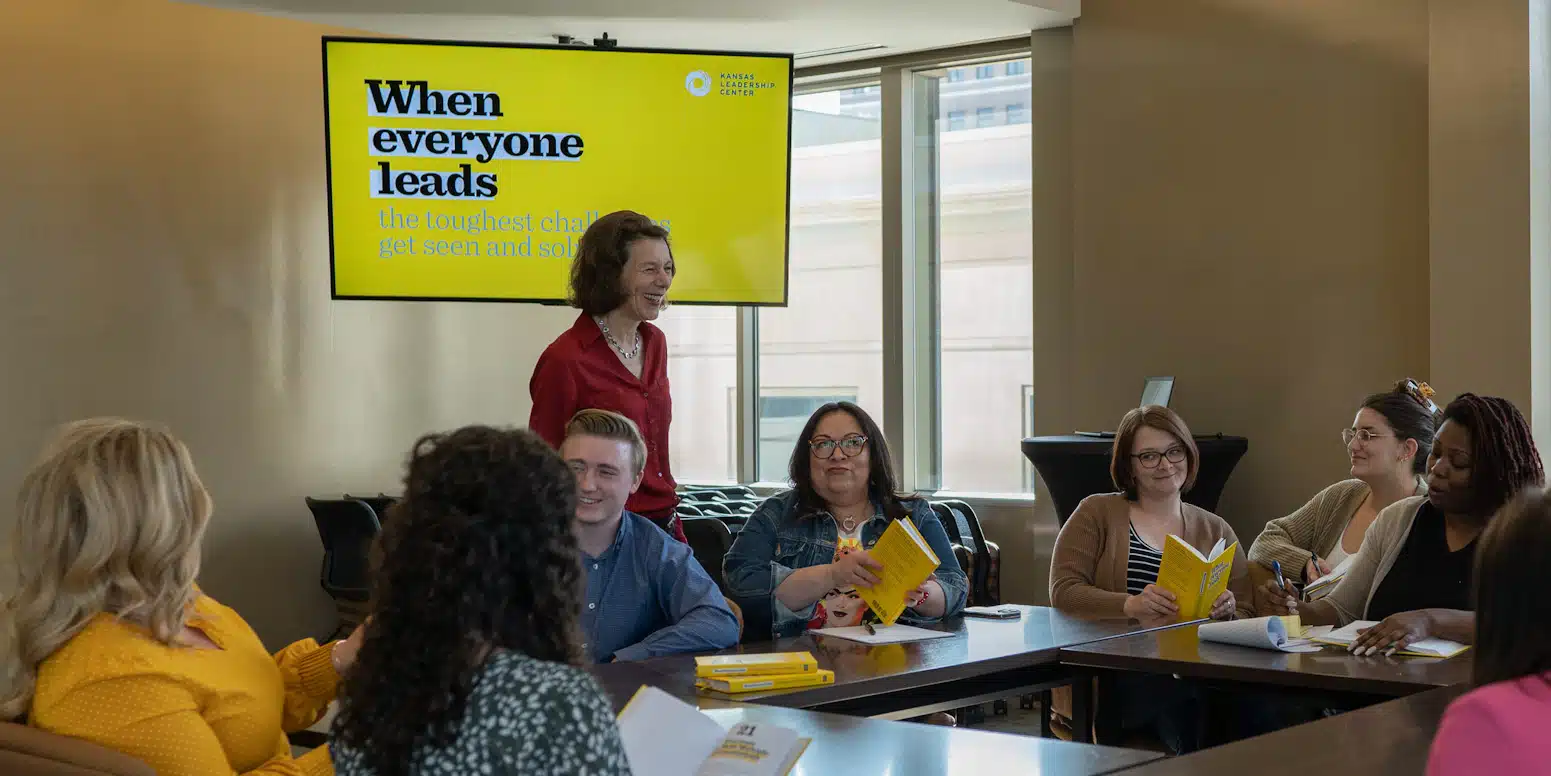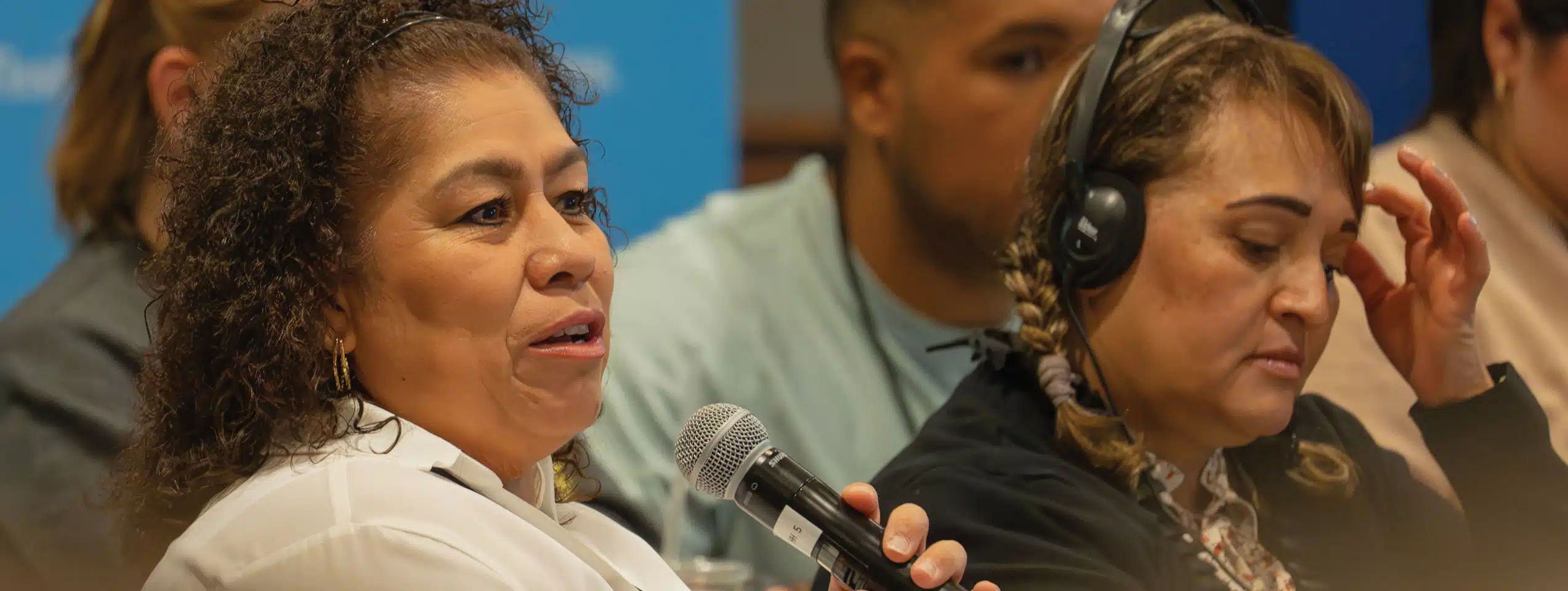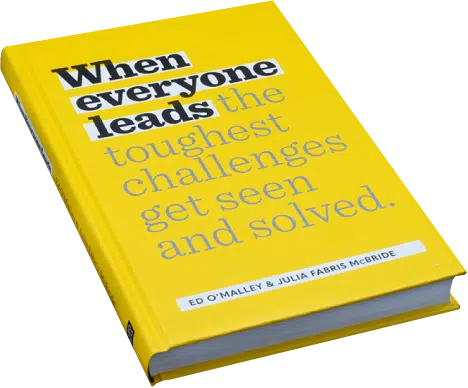Silver linings have been hard to come by during COVID-19, but strengthened civic ties may very well be a bright spot that endures in Kansas communities long after the pandemic recedes.
Faced with fighting a common enemy, citizens from all walks of life rallied around the cause of encouraging people to wear masks, socially distance and follow all the other basic public health guidelines.
Solutions ranged from mask-designing contests, volunteer home-delivery services, care packages for nursing home residents, and the crazy notion of coaxing folks outdoors during the dead of winter. And those ideas were just the tip of the iceberg.
Esprit de corps took hold in urban areas and in hamlets like Tyro, a town of fewer than 200 residents just west of Coffeyville.
As lead pastor of Tyro Christian Church, Brian Ingalls even described the pandemic as a blessing. He relished the goodwill and new connections spawned by the church’s home deliveries. No politics. No arguments. Just a simple focus on helping your neighbor.
“And that’s really what we’re all about, anyway,” Ingalls said, “to just try to serve others.”
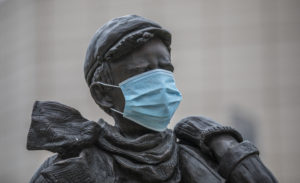
The Promise of America Statue, in Wichita. The stature is of Farris George Jabara a native of Lebanon, accepted the promise of America and its challenge in 1903. He was 15 years-old and became a noted cattleman. (Jeff Tuttle)
Strengthening bonds
Kansas Beats the Virus – a partnership between the Kansas Leadership Center and the state of Kansas – convened thousands of Kansans through approximately 850 community meetings in December.
The idea was simple: Let homegrown solutions take root. Seed funding came through roughly $850,000 in grants awarded through the initiative.
Community leaders are busy people. They fit in volunteer work with responsibilities at home and at work. Their various activities might connect them on individual projects, but then it is off to the next thing, until another project connects them again.
In some instances, Kansas Beats the Virus helped weave those bonds even tighter into the fabric of the community.
Such was the case in Caldwell with Matt Johnson, Brooke Bollman and Jill Kuehny. Johnson is pastor of First United Methodist Church of Caldwell, Bollman is administrator of Sumner County Hospital District #1, and Kuehny is a businesswoman and city commissioner.
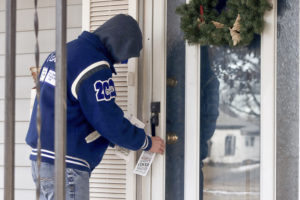
Jace Baker takes part in a Kansas Beats the Virus campaign in Caldwell, Kansas, where door hangers reminded people of safe habits. (Jeff Tuttle)
The three knew one another through chamber of commerce meetings. Kuehny is also a congregant at First United Methodist, and she had collaborated with Bollman on health-related campaigns. Kuehny also brought a wide network of contacts through her professional life and civic involvement, including serving as chair of the health group Vision Caldwell.
The Caldwell convening produced the idea of door hangers preaching safe practices. They read “Protect our small but mighty critical access regional hospital.” National Honor Society students passed them out the week before Christmas.
Kuehny had her office staff design and print the door hangers.
“I would say (the convening) probably strengthened (our relationship) because now we know we can bring these people together, and we’re going to come up with something to help our community,” Johnson said. “Next time … I know who to call.”
Baldwin City had a similar experience in addressing a serious case of bad timing with its new park, Sullivan Square. The park honors former mayor Lucy Sullivan, who was elected in 1889, just two years after Kansas women were first allowed to vote in municipal elections.
Like its namesake, the park is designed to bring people together. But people have mostly stayed away because of COVID.

Lucy’s Legacy is a bench mural that depicts Lucy Sweet Sullivan, who was elected the first female mayor of Baldwin City, Kansas, in 1889. (Lumberyard Arts Center)
Enter the local library, which organized a Kansas Beats the Virus convening. The effort culminated in grant funding from the campaign to purchase outdoor space heaters.
Plans call for yoga classes.
Also in the works is a storybook event where children will walk from one poster-sized page to another while listening to jazz musicians at each stop. The concession stand will serve food from local restaurants.
“What these meetings did was strengthen a lot of connections that were already there,” said Library Director Wendy Conover. “At the grant meeting we had the mayor, city councilman, representatives from the library, art center, school district and recreation committee – all of us pretty much knew each other. We are all working together to do something good for our community.”
Above and beyond
When talking about interconnectedness, one can’t ignore Adrion Roberson in Kansas City and Phil Black in Salina. These two men were among the most prolific meeting organizers during the monthlong Kansas Beats the Virus campaign: Roberson with 30, and Black with 17.
A Kansas City native, Roberson is entrenched in his community.
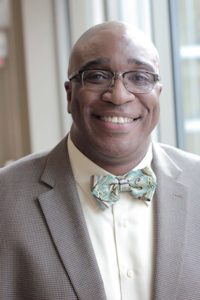
Adrion Roberson of Kansas City, Kansas, convened or facilitated 30 Kansas Beats the Virus meetings.
He serves as co-pastor of the Berean Bible Fellowship Church and operates KC United! Youth/Family Sports & Education Initiative, which he co-founded with his wife.
KC United! runs summer programming focusing on the arts, along with science, technology, engineering and math. The nonprofit also organizes fall athletics for boys and girls.
Ideas from Roberson’s meetings that received Kansas Beats the Virus funding included one to provide wireless hotspots to seniors, and another to host Zoom workouts. He and his network of conveners share a bond.
“We all just have this close personal relationship and we all just love the city,” Roberson said. “It just formulated into this amazing team that we had and got the work done.”
One of the biggest plusses for Roberson, and ultimately for the youth participants, is that the nonprofit enters this year with a huge leg up thanks to an honorarium paid to conveners.
Between Roberson and other friends of the organization, they hosted nearly three dozen meetings. That netted more than $30,000 for the nonprofit, which typically enters a calendar year with little cash on hand. The operation pretty much runs hand to mouth based on program fees and donations.
Realizing the potential windfall from hosting the meetings, Roberson was all in. “It was fourth gear – lets go.”
In Salina, residents of all ages pursued Kansas Beats the Virus projects aimed at a broad spectrum of the county’s population: hospitalized COVID-19 patients, domestic-violence victims, transient families, and lower-income residents.
A lot of that resulted from Black’s handiwork.
Since moving to Salina in 2002, he has built connections with residents as an elected official and a member of various community and local government groups.
Black worked those connections to mobilize his community’s participation in Kansas Beats the Virus. “As far as I was concerned, that was my job for that time.”

Salina musician Megan Gladbach is part of The Radicles, a musical group that spent last year composing songs with themes related to the pandemic. (Facebook)
One beneficiary of Black’s time and energy was The Radicles, a local band that spent much of 2020 writing, rehearsing and recording songs about hope, growth and resilience – themes that resonate during a pandemic.
The Radicles and two other area bands — the husband/wife duo Treehouse and Don Wagner and Friends — are staging a virtual music festival in a couple weeks.
The first 100 audience members who share their personal plans to beat the virus will get a free copy of The Radicles’ first CD, “Seed.” The band will share excerpts of those plans on its Facebook page.
Coffee talk
Thomas A. Edison once said, “I have not failed. I’ve just found 10,000 ways that won’t work.”
Andrew Gough can relate through his experience with Kansas Beats the Virus. The owner of Reverie Coffee Roasters in Wichita, he had high hopes for the ideas he and his coffee shop brethren hatched to help staff and customers struggling financially due to the pandemic.
The plans didn’t materialize. Gough suspects everyone just got too busy.

Andrew Gough, owner of Reverie Coffee Roasters in Wichita.
But Gough does not consider that a failure. The brainstorming got the creative juices flowing, and he hoped that translated into actions not contemplated in the meeting.
“I think the point is to get people activated, and we think we’re being activated to create one new idea, but that’s not the limit of our success opportunity,” he says. “Maybe we’re influencing people in ways not discussed in the group.”
Perhaps, he said, the discussion prompted churchgoers to push for safe practices within their congregations, encouraged shoppers to act safely in the grocery store, and emboldened people “standing up for people’s rights to challenge those that don’t wear masks.”
Coffee (or the lack thereof, to be more precise) also stimulated creativity in Chapman, where Traci Lucas used a Wichita example to illustrate the importance of homegrown solutions to beating the virus.
The backstory is this: Lucas was working toward opening a café as an after-school hangout for students when the pandemic hit, hampering efforts to raise the $20,000 needed for coffee equipment. She opened the café early, though, as a much-needed hub for remote learning, using a Kansas Beats the Virus grant to expand capacity to purchase outdoor space heaters.
To Lucas, this was a perfect solution for a sprawling school district where students needed a safe spot to kill time before evening activities. Many students didn’t have the ability to go back and forth more than once in an evening.
A billboard like the one in Wichita? No way. They don’t have billboards in farm communities, she said.
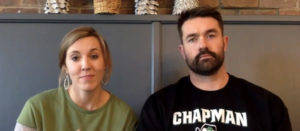
In this screenshot from a Facebook video, Traci Lucas and her husband, Zach, explain the ins and outs of their student-focused coffee shop in Chapman, Kansas.
For Lucas, it was like Edison in reverse. Her feel for the community meant she arrived at a perfect solution first, rather than failing 10,000 times.
She still fields a lot of questions about when the coffee equipment will be installed, but Lucas has learned that is not a necessary ingredient for success.
On Wednesday, Lucas and her co-director, Rhonda Nelson, will launch Wednesday night teen dinners. Part of the fun will be a local version of Taste Buds, a popular contest on “Ellen’s Game of Games,” where blindfolded contestants guess what they’re eating.
“The whole crowd is going to be dying laughing for sure,” Lucas said.
The next step
As much of the attention has now shifted to rollout of the vaccine, Kansas Beats the Virus alumni stand ready to apply their lessons learned to this next phase of the fight against COVID.
The state is working with the Kansas Hospital Association, federally qualified health centers and local public health departments to allocate doses to communities, said Marci Nielsen, special advisor to Gov. Laura Kelly. Limited availability from the federal level has hampered efforts.
Approximately 6.4% of the state’s population had been vaccinated as of Monday, according to state data. About half of doses distributed from the state down to the local level have been administered.
The state is expecting that its supply of the Moderna vaccine will increase by 30% soon. But as the state expands eligibility to more people, Nielsen said, the numbers remain challenging. Approximately 1 million people are now eligible for the vaccination, but the state only receives about 45,000 vaccines each week.
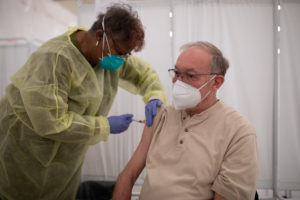
Volunteer Curt Robinson, 77, who has been helping with COVID-19 testing in Wyandotte County since early in the pandemic, was the first person to receive a shot at the mass vaccination site in Kansas City, Kansas. (Submitted)
Critical to the vaccination effort are mass vaccination sites like the one at 7836 State Ave. in Kansas City. It is in a former Kmart store.
Between that one, and two others in the works, Wyandotte County expects these facilities to be able to vaccinate nearly 5,000 people a day. The one on State Avenue has vaccinated that many people total since opening in late December.
The Kmart site is a natural fit, since it already serves as a COVID testing site, said Travis Lanter, emergency preparedness coordinator for the county. Long-term, he hopes to be of service to surrounding counties.
“We are part of the whole community, not just our county,” Lanter said. “People need to know: the process is working, the plans are working, they just need to be patient until we can get to all of the tiers and get people vaccinated.”
Back in Caldwell, Bollman, the hospital administrator, is hoping Pastor Johnson can connect with older residents through his church to help them overcome any technological problems they could be having navigating the online sign-ups. Bollman also hopes that Kuehny, the commissioner and businesswoman, can again help with printing to help recruit volunteers for the vaccination clinics.
“I think the important part of (vaccine) administration is pulling in all of these groups again to figure out how do we get those out,” Bollman said. So the trio will forge on, tackling the next community problem that requires a leader from church, health care and city government.
4-H groups also stand prepared to apply the lessons they learned from the dozen meetings they convened through Kansas Beats the Virus, said Aliah Mestrovich Seay, 4-H development specialist at Kansas State University.
She said the KLC meetings naturally fit with a 4-H pilot project of training youth in civic engagement. The training in working through challenging issues, Mestrovich Seay said, lends itself to getting their communities on board with vaccination.
But even more important, she said, “I hope that this is just the beginning of a series of events around better health and how we navigate this pandemic differently based on the local community we’re in and the family we’re from.”
The following reporters contributed to this report: Amy Geiszler-Jones, Celia Hack, Jerry LaMartina, Dawn Novascone, Leah Shaffer, Beccy Tanner and Tammy Worth.
